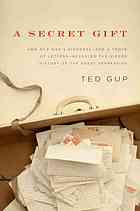
A Secret Gift
How One Man's Kindness—and a Trove of Letters—Revealed the Hidden History of the Great Depression
کتاب های مرتبط
- اطلاعات
- نقد و بررسی
- دیدگاه کاربران
نقد و بررسی

September 6, 2010
In a book grown out of a New York Times op-ed piece that drew a huge response, Gup (The Book of Honor) explores an unusual act of generosity by his grandfather, Sam Stone, during the Great Depression and other mysteries of Stone's life. Discovering a trunk full of old letters addressed to "Mr. B. Virdot," Gup soon learned that the letters were responses to a newspaper ad Stone ran before Christmas 1933, anonymously promising $10 to 75 of Canton, Ohio's neediest families if they wrote letters describing their hardships. (Some of the heartbreaking letters are reprinted here.) But Gup soon learns that Stone had other secrets: the jovial, wealthy businessman had escaped a horrific childhood as a Romanian Jew, immigrating to America and reinventing himself to fit into all-American Canton, Ohio. Gup also tracked down families who benefited from Stone's gift to discover the impact it had on their lives. Gup paints sobering pictures of "the Hard Times" and the gift made by a successful man who hadn't forgotten his own hard times.

September 15, 2010
Former investigative reporter Gup (journalism, Emerson Coll.; Nation of Secrets) presents a compelling story of charity and perseverance. He provides a snapshot of life in Canton, OH, during the Great Depression and relays his discovery, after finding a "trove of letters" addressed to one B. Virdot, of missing pieces of his grandfather's life. B. Virdot turns out to have been an alias used by his grandfather, clothing store owner Sam Stone, as he gifted several families with $5--a significant sum during the Great Depression. Initially, these acts of kindness appear random and reveal little about an enigmatic yet caring man. However, it is through the thank-you letters from families touched by the kindness of B. Virdot--and through Gup's relentless quest for answers--that readers learn the full story of Sam Stone. VERDICT Although history buffs won't find new ground covered, Gup's narrative style combined with first-person accounts and profiles of the recipient families put a human face on this part of history and make this an inspiring and informative read, best for history novices.--Tamela Chambers, Chicago P.L.
Copyright 2010 Library Journal, LLC Used with permission.

October 15, 2010
Investigative reporter Gup researched a file of Depression-era letters preserved by his family. They were responses to a Canton, Ohio, newspaper notice that Gups grandfather, using a pseudonym, had placed in December 1933, which offered a monetary gift and, perhaps more importantly, a promise of anonymity to recipients of his charity. That tapped into social attitudes characteristic of the Depression generationpride in self-reliance matched by mortification to be seen accepting help, overlain with disdain for complaining. Those characteristics vividly animate Gups remarkable portraits of the letter writers, which encompass their backgrounds, their bewildering descent to destitute circumstances, and the influence of the Depression on their own and their childrens subsequent working lives. A subplot involving the identity of Gups advertising grandfather, who, for unknown reasons, obfuscated his birth in Romania, also productively interacts with the main plot of what motivated his manner of giving money away at Christmastime. Highly affecting emotionally, Gups empathic portraits should powerfully pique memories in Gups readers about their own familys experience of the economic trauma of the 1930s.(Reprinted with permission of Booklist, copyright 2010, American Library Association.)

























دیدگاه کاربران